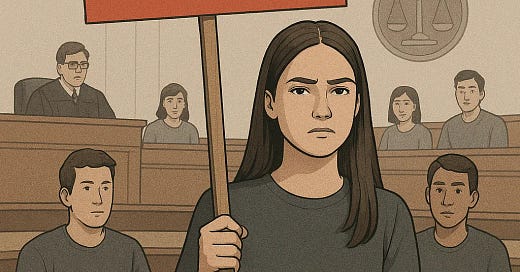Are law colleges safe spaces for dissent?
How many of us have felt like Indian academia has a very strong bias against certain viewpoints and a very strong inclination towards others?
I remember how, just a few years ago, students across law colleges were actively protesting against the Citizenship Amendment Act, 2019. Many believed the legislation unfairly targeted minority communities in India and came prepared—with an arsenal of judicial precedents and constitutional arguments—to back their stance.
But those who disagreed with the protests didn’t seem to enjoy the same freedom. Even though I had already graduated by the time the protests reached their peak, I watched as many of my peers and colleagues voiced their strong opposition to the Act on platforms like LinkedIn, Facebook, and in college WhatsApp groups. Around that time, I was also running a public social media account called “Tishya Says,” where I received a flood of messages from students describing the hostility they faced simply for expressing a contrary view.
These weren’t students without arguments. Many who disagreed with the protests had equally cogent legal reasoning. And yet, law colleges—spaces that should be fertile ground for dissent, dialogue, and disagreement—felt increasingly unsafe for them. I heard from students who feared academic repercussions if they expressed their views in class or on assignments. Others spoke of losing friends, being alienated from peer groups, and the emotional toll of being socially excluded.
It was deeply disappointing. Perhaps naively, I expected this kind of intellectual intolerance from universities like JNU or certain DU colleges, but not from institutions dedicated to the study of law—where we are supposed to be trained to argue both sides of a case, to uphold liberty, and to defend the right to dissent. More importantly, the law—at its core—is governed by one golden principle - individual liberty is sacrosanct. The fact that law students, after years of education, were so quick to forget this principle was worrisome. What hope was there for students of other streams, when those immersed in the very ethos of liberty could not make space for dissenting voices?
Today, as I prepare to enter Indian academia, I often think back to those protests and ask myself—what might happen if I choose not to conform? While much attention is paid to the consequences faced by academics who dissent from the views of the ruling establishment, an equally troubling reality plays out at the student level. Those who disagree with their professors—whether on matters of law, politics, or pedagogy—often face subtle but serious repercussions. Some are silenced, others penalized through grades. Either path can leave a lasting dent in their professional futures.
What makes this even more unsettling is the irony: many of these very professors, who rightfully raise their voices against state censorship, show no hesitation in censoring their own students. And what’s worse—they don’t even seem to care.
This must change. We cannot expect the masses to inculcate feelings of fraternity and toleration, when the nations most educated refuse to do the same.
In hindsight, what unfolded in many law colleges during the CAA protests was not just a clash of ideologies—it was a test of the very values legal education is meant to instill. The right to hold and express a dissenting view, without fear of reprisal, is foundational to both democracy and the practice of law. When even law students begin to silence each other, not through argument but through exclusion and fear, we must pause and ask: what kind of lawyers—and citizens—are we becoming? Legal education must do more than produce advocates for popular causes; it must cultivate a culture where disagreement is not only tolerated, but respected. Without that, we risk producing lawyers who speak only when it is safe, not when it is necessary.




